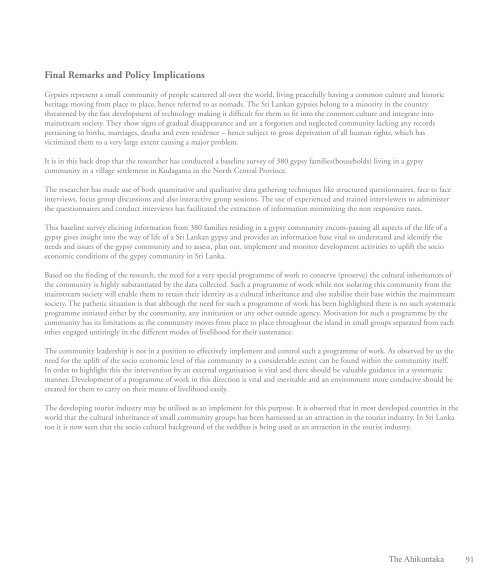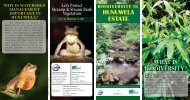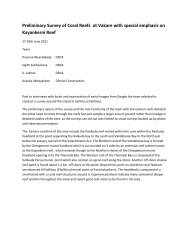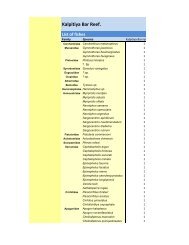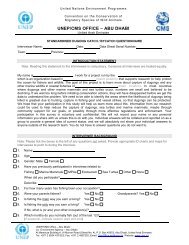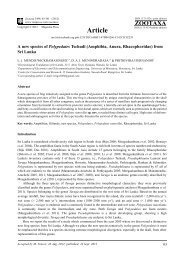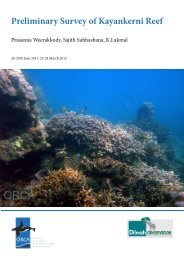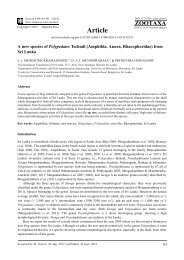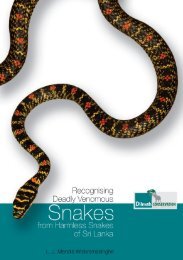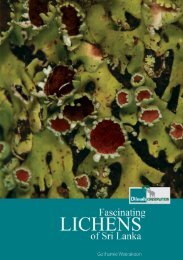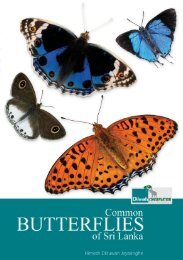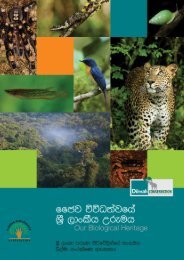The Ahikuntaka
A publication documenting the lives and livelihoods of the Ahikuntaka or gypsy community in Sri Lanka. A collection of vibrant photographs and a baseline survey on the current socio economic status of the Ahikuntaka conducted by the Colombo University complement this timely publication.
A publication documenting the lives and livelihoods of the Ahikuntaka or gypsy community in Sri Lanka. A collection of vibrant photographs and a baseline survey on the current socio economic status of the Ahikuntaka conducted by the Colombo University complement this timely publication.
You also want an ePaper? Increase the reach of your titles
YUMPU automatically turns print PDFs into web optimized ePapers that Google loves.
Final Remarks and Policy Implications<br />
Gypsies represent a small community of people scattered all over the world, living peacefully having a common culture and historic<br />
heritage moving from place to place, hence referred to as nomads. <strong>The</strong> Sri Lankan gypsies belong to a minority in the country<br />
threatened by the fast development of technology making it difficult for them to fit into the common culture and integrate into<br />
mainstream society. <strong>The</strong>y show signs of gradual disappearance and are a forgotten and neglected community lacking any records<br />
pertaining to births, marriages, deaths and even residence – hence subject to gross deprivation of all human rights, which has<br />
victimized them to a very large extent causing a major problem.<br />
It is in this back drop that the researcher has conducted a baseline survey of 380 gypsy families(households) living in a gypsy<br />
community in a village settlement in Kudagama in the North Central Province.<br />
<strong>The</strong> researcher has made use of both quantitative and qualitative data gathering techniques like structured questionnaires, face to face<br />
interviews, focus group discussions and also interactive group sessions. <strong>The</strong> use of experienced and trained interviewers to administer<br />
the questionnaires and conduct interviews has facilitated the extraction of information minimizing the non responsive rates.<br />
This baseline survey eliciting information from 380 families residing in a gypsy community encom-passing all aspects of the life of a<br />
gypsy gives insight into the way of life of a Sri Lankan gypsy and provides an information base vital to understand and identify the<br />
needs and issues of the gypsy community and to assess, plan out, implement and monitor development activities to uplift the socio<br />
economic conditions of the gypsy community in Sri Lanka.<br />
Based on the finding of the research, the need for a very special programme of work to conserve (preserve) the cultural inheritances of<br />
the community is highly substantiated by the data collected. Such a programme of work while not isolating this community from the<br />
mainstream society will enable them to retain their identity as a cultural inheritance and also stabilise their base within the mainstream<br />
society. <strong>The</strong> pathetic situation is that although the need for such a programme of work has been highlighted there is no such systematic<br />
programme initiated either by the community, any institution or any other outside agency. Motivation for such a programme by the<br />
community has its limitations as the community moves from place to place throughout the island in small groups separated from each<br />
other engaged untiringly in the different modes of livelihood for their sustenance.<br />
<strong>The</strong> community leadership is not in a position to effectively implement and control such a programme of work. As observed by us the<br />
need for the uplift of the socio economic level of this community to a considerable extent can be found within the community itself.<br />
In order to highlight this the intervention by an external organisation is vital and there should be valuable guidance in a systematic<br />
manner. Development of a programme of work in this direction is vital and inevitable and an environment more conducive should be<br />
created for them to carry on their means of livelihood easily.<br />
<strong>The</strong> developing tourist industry may be utilised as an implement for this purpose. It is observed that in most developed countries in the<br />
world that the cultural inheritance of small community groups has been harnessed as an attraction in the tourist industry. In Sri Lanka<br />
too it is now seen that the socio cultural background of the veddhas is being used as an attraction in the tourist industry.<br />
<strong>The</strong> <strong>Ahikuntaka</strong><br />
91


